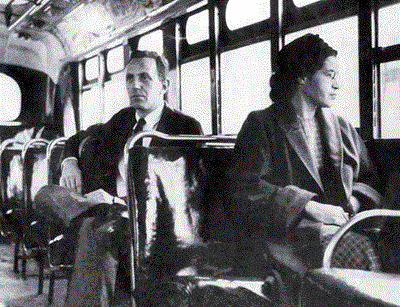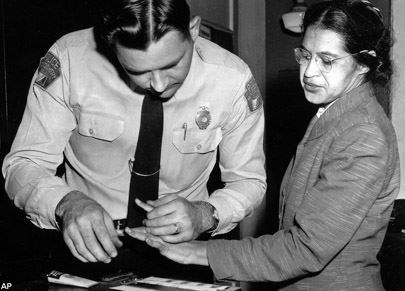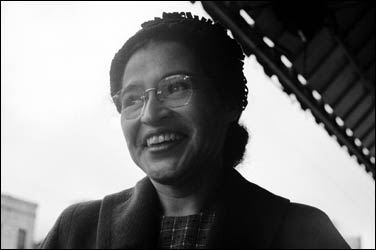Who was your hero as a child? Many children idolize Spiderman as their hero because of his strength and superpowers that he utilizes to save others. Would Spiderman still be a hero offscreen? Does he characterize the traits of a hero? Without his fame and superpowers, Spiderman would not be classified as a hero. Presently, many people in society picture a hero as someone who exhibits a strong, powerful character and a special talent. Yet, not all athletes and celebrities deserve the title of a hero simply because of their money or strengths in sports. Heroism should reside in those who stand up for the greater good of the community, not for fortune or fame. There are only a few who portray these attributes of a true hero. Rosa Parks, a civil rights activist, not only was respected as a leader, but also overcame many obstacles, stood up for what she believed in and exemplified herself as an inspirational role model for many.
 |
| Rosa refused to give up her seat to a white man. (http://martinlutherkingfacts.com/the-bus-boycott.php) |
Rosa Parks was born Rosa Lee McCauley on February 4, 1913, to Leona Edwards McCauley and James McCauley in Tuskegee, Alabama. Rosa grew up in a close knit family whose reputation was held in high respect. As a child, Rosa wanted to receive an education so she lived with her aunt in Montgomery, Alabama where she attended a nine month school. In her teenage years, Rosa read, sewed, and attended the local African Methodist Episcopal (A.M.E) Church. She also was active in youth organizations as an adviser and became a member of the Montgomery Voters League. Rosa married a barber by the name of Raymond Parks, who was a member of the Civil Rights Movement in December of 1932. In 1943, she was elected as Secretary for the Montgomery chapter of the National Association of the Advancement of Colored People (NAACP) and became a civil rights advocate. Her refusal to relinquish her seat on a city bus to a white passenger on December 1, 1955, sparked the Civil Rights Movement and a boycott lasting three hundred eighty-one days, making a huge impact on the world. Rosa died in 2005, but she left behind a historical legacy in society today.
Rosa faced many hurdles throughout her lifetime, but conquered them with the help of her strong character. Her determination prevailed as she grew older, the article, DISCovering Biography states that, “Despite personal tragedy and failing health, Rosa continued to work tirelessly for the rights of all people” (“Parks, Rosa (1913-)” DISCovering Biography). As bumps appeared on her road to equality, Rosa never abandoned her vision because she wanted to reach out to others even as she struggled with her health. Her mission was to urge the abolishment of segregation and the establishment of equality for all while demonstrating perseverance and selflessness as she faced obstacles along the way. Rosa continued to challenge the status quo and fought to preserve the rights of others. As a result to her unwillingness to concede her bus seat to a white passenger, “Parks was beaten and robbed in her Detroit home; the robber was soon arrested, and Parks recovered fully. The next year she participated in the Million Man March in Washington D.C., where she gave an inspirational speech” (Strong). Rosa promoted her ideas despite the disapproval of many. She paid no heed to what others thought of her, she only worried about the troubles brought forth by racism. Rosa did not let malicious actions overcome her state of mind, despite the damages it had cost her because she recognized the enormous problem in the lives of others in her neighborhood. As a result of her beliefs and actions, “threats and constant phone calls she received during the boycott that caused her husband to have a nervous breakdown, and in 1957 they moved to Detroit where she had become a public figure and was often sought out to give talks about civil rights” (“Parks, Rosa (1913-)” UXL Biographies). Rosa not only assisted those in her community, but she also shared her perspective around the world on desegregation and her pursuit to end racism. She will always be commemorated for her fortitude and strength as she overcame hurdles emerged her journey towards equality.
 |
| Rosa Parks was fingerprinted on December 1, 1955. (http://www.bbc.co.uk/1xtra/tx/gallery/rosa_parks.shtml) |
As a leader, Rosa was outspoken about her ideas and feelings towards a subject she believed very strongly in for the wellbeing of others. She is well known for “the evening of December 1, 1955, for refusing to relinquish her seat to a white patron, thereby violating the segregation laws of Montgomery, Alabama” (“Parks, Rosa (1913-)” DISCovering Biography). Rosa ignored the consequences when she violated the law in order to prove the law false as a step towards equality for all mankind. Her arrest symbolized a sacrifice Rosa was willing to make to demonstrate the unfairness of bus segregation. She believed that the situation was not fair, so she advocated her beliefs, even though it wasn’t easy to do so. As a result of Rosa’s outspoken words, there were many boycotts; Rosa also participated in her own way, “for instance, by walking up the stairs of a building rather than riding in an elevator marked ‘blacks only’” (“Parks, Rosa (1913-)” UXL Biographies). As many stood in the background, Rosa stepped forward to express her opinion when no one else would. She took a laborious route in order to have a positive impact on her community and society. Even though she felt very strong about what she thought, she didn’t want it to lead to violence. Heroes aren’t violent; some take very difficult stands using without physical or verbal contact which can be more powerful than words can describe. As Petruso states, “Parks became regarded as an important, inspirational figure in the civil rights movement, she used her position to raise funds for the NAACP and continue to push for greater racial equality” (Petruso). She did not give up after she was arrested; she continued to spread her message because it made her realize that the issue of racism was more than city bus segregation. Through her selflessness, integrity and determination, she was able to use her leadership abilities to the fullest potential. Rosa didn’t think about just herself, she thought of the thousands, or even millions, who were affected with this issue daily.
 |
| The civil rights activist, Rosa Parks (http://www.newton.k12.ma.us/bigelow/classroom/yerardi/blackhistory05/section3/cristinal/03blackhist05cl.htm) |
Parks was an influential figure in the lives of many people throughout her life and her actions continue to be an inspiration to this day. She is perceived as a very courageous, sincere and selfless person who has affected many people. Rosa is admired for, “Her courage has inspired others to take chances, work for the betterment and advancement of all people, and continue to challenge and change society's foibles and discriminatory actions” (“Parks, Rosa (1913-)” DISCovering Biography). This heroic figure serves as a role model, someone that others respect for her fearlessness and her powerful voice for other’s rights. Her legacy brings about the best in others and inspires them to articulate their sentiments and to resolve problems in their community. Rosa also tried to change the world for the greater good of all people. She encourages others to step out of their comfort zones by being a leader and to stand up for what they believe in. Her dedication to this subject inspires all; not only people during her time period but also people today. According to the DISCovering Biography, “She symbolizes many things to many people. For those in the 1950s and 1960s, she ignited a movement that was dormant for far too long. For individuals in the 1990s, she is important because of her tireless efforts to alter society for the better. Future generations will still feel her influence” (“Parks, Rosa (1913-)” DISCovering Biography). Rosa’s heroism was illustrated by her constant efforts to improve society. She characterizes a perfect example of a true hero, unlike the cartoon hero of spiderman. Spiderman is a character, but Rosa was a hero with character.
Page created on 5/20/2010 12:00:00 AM
Last edited 5/20/2010 12:00:00 AM
